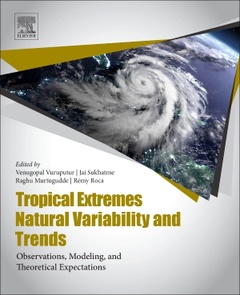Tropical Extremes Natural Variability and Trends
Coordonnateurs : Vuruputur Venugopal, Sukhatme Jai, Murtugudde Raghu, Roca Rémy

Tropical Extremes: Natural Variability and Trends features the most up-to-date information on present and future trends related to climate change and tropical extremes. Including contributions from the foremost experts in the field, this important reference addresses the science behind climate change and natural variability in relation to tropical extremes. The book also includes practical insight into modeling and observation approaches. In a warming world, the increase of weather extremes presents a scientifically complex and societally relevant challenge. The book confronts these challenges with observational evidence, modeling studies and expected impacts. This is an essential reference for researchers, modelers and students in the fields of climate and atmospheric science looking to better understand the causes and effects of tropical extremes and natural variability.
2. South Asian Monsoon Extremes
3. Overview of Climate Models and Tropical Extremes
4. Hotspots of relative sea level rise in the Tropics
5. South American Monsoon and its Extremes
6. Investigating Tropical Extremes Impacts on Public Health and Food Security: Case Studies from South America and West Africa
7. Extreme Rain Evolution in West Africa
8. Extreme El Niño events
9. Tropics as Tempest
Jai Sukhatme is an Assistant Professor at the Center for Atmospheric and Oceanic Sciences of the Indian Institute of Science. He received his PhD in Geophysical Sciences from the University of Chicago. He has been an Associate Fellow of the Royal Meteorological Society (UK) since 2014. He has contributed to 19 published journal articles.
Raghu Murtugudde is a Professor in the Department of Atmospheric and Oceanic Science and Earth System Science Interdisciplinary Center at the University of Maryland. He received his PhD in Mechanical Engineering from Columbia University. He has been an invited keynote speaker and distinguished lecturer on many occasions and has contributed to over 200 published journal articles and edited one book and contributed more than 10 book chapters.
Rémy Roca is Research Director at CNRS. He received his HDR from University Pierre et Marie Curie 6 and his PhD from University Denis Diderot Paris 7. He is co-chair of the International Precipitation Working Group and has contributed to over 50 published journal articles. His research interests include water and energy cycle in the tropics, monsoon meteorology and hydrology, mesoscale convective systems, severe weather systems, rainfall, and satellite measurements.
- Illuminates the role of natural variability and climate change in determining the fate and state of tropical extremes
- Offers a robust guide for analysis relating to the impacts of extremes, thus providing a potential roadmap for navigating the future of risk analysis and the water-food-energy nexus
- Edited by a diverse team of global experts
- Includes contributions from leading researchers in the field, comprising the most up-to-date understanding of tropical extremes
Date de parution : 09-2018
Ouvrage de 364 p.
15x22.8 cm
Thème de Tropical Extremes :
Mots-clés :
Altimetry; Case study Ouagadougou; Case study; Climate change; Climate models; Climate variability; Delta; Disasters; El Ni�o�southern oscillation; Extreme precipitation; Flood; GPS; Hydrometeorological extremes; Integrated data viewer; Intensity�duration�areal�frequency curves; Land movement; MERRA; Monsoon cyclone; Observations; Peru; Physical atmospheric processes; Public health; Rainfall extremes; Relative sea level; Sahel; Satellite data; Social vulnerability; Teleconnections; Tid



